Samuel Worcester (1796-1821) graduated from Dartmouth (1795) and studied theology under Rev. Samuel Austin in Massachusetts. He was a teacher at the New Ipswich Academy for a short time and was ordained in 1796. Worcester later taught at Dartmouth (1804) and was secretary for the American Board of Commissioners for Foreign Mission at its founding in 1810.
The following sermon was preached by Rev. Worcester on the day of national fasting proclaimed by President James Madison in 1812.
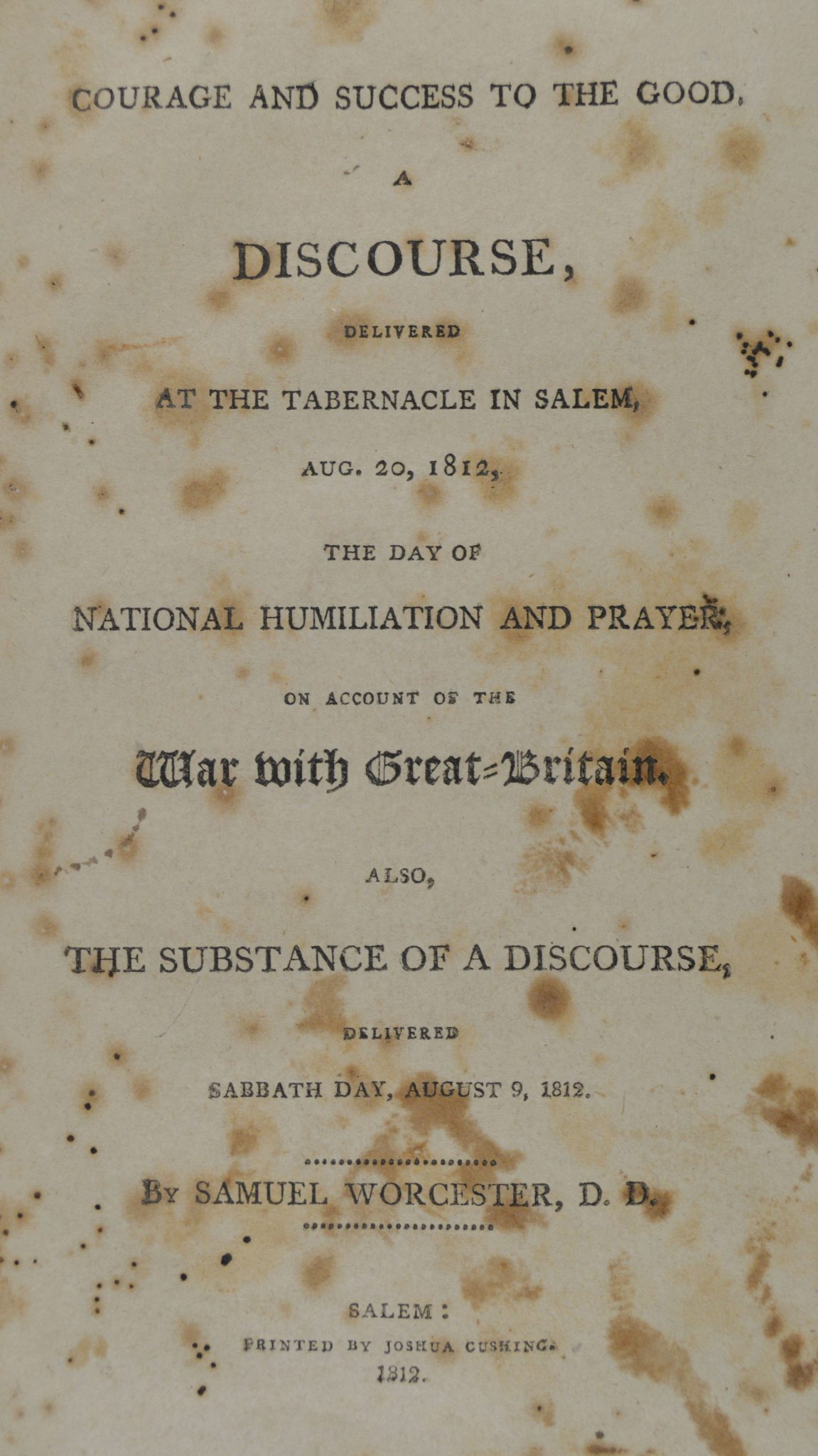
A
DISCOURSE,
DELIVERED
AT THE TABERNACLE IN SALEM,
AUG. 20, 1812,
THE DAY OF
NATIONAL HUMILIATION AND PRAYER
ON ACCOUNT OF THE
WAR WITH GREAT-BRITAIN
ALSO,
THE SUBSTANCE OF A DISCOURSE,
DELIVERED
SABBATH DAY, AUGUST 9, 1812.
By SAMUEL WORCESTER, D. D
Discourse
Deal courageously, and the Lord shall be with the good.
In the height of his prosperity, however, Jehoshaphat committed a grievous fault. He formed an alliance with Ahab king of Israel, who had “sold himself to work wickedness in the fight of the Lord.” He visited Ahab at Samaria; and Ahab said to him, “Wilt thou go with me to Ramoth Gilead? And he answered him, I am as thou art, and my people as thy people; and we will be with thee in the war. The kings with their forces accordingly went to Ramoth Gilead to fight with the Syrians; and the event of the battle is well known. Agreeably to the prediction of Micaiah the son of Imlah, Ahab was slain, and “all Israel were scattered upon the mountains as sheep that have no shepherd. – Jehoshaphat, however, escaped from the battle and “returned to Jerusalem in peace.” But as he was returning, “Jehu the son of Hanani the seer, went out to meet him, and said to king Jehoshaphat, shouldest thou help the ungodly, and love them that hate Lord? Therefore is wrath upon thee from before the Lord.”
It was a critical day with that nation. Not only had the king himself sinned; but, in consequence of his criminal alliance with Ahab, the people of Judah were corrupted by their intercourse with the idolatrous people of Ahab’s realm. Idolatry prevailed, and iniquity abounded; God was rising up in displeasure, and his hand was just ready to “take hold of judgment:” a speedy change was necessary to avert the impending storm. Jehoshaphat saw the crisis, and yielded to its impression. Along with the awful rebuke and warning given him from God, there was a kind intimation adapted to inspire hope. “Nevertheless,” said the prophet, “there are good things found in thee.” Animated by this encouragement, and penitent himself, he engaged without delay in vigorous endeavors for a general reformation. Thinking it not enough to direct the princess, priests, and Levites, as in the early part of his reign he had done, to teach in the cities of Judah; the king now went out in person “through the people from Beersheba to mount Ephraim,” from the southern to the northern border of his kingdom, “and brought them back unto the Lord God of their fathers.” To forward and establish the good work, he deemed it necessary to have good men in public office; “and he set judges in the land throughout all the fenced cities, city by city;” and gave them a charge worthy to be deeply imprinted on the minds of all magistrates and people: “Take heed what ye do; for ye judge not for men, but for the Lord, who is with you in the judgment. Wherefore now let the fear of the Lord be upon you; take heed and do it: for there is no iniquity with the Lord our God, nor respect of persons, nor taking of gifts.” To the judges of the high court at Jerusalem in particular, he added; “Thus shall ye do in the fear of the Lord faithfully, and with a perfect heart.—Deal courageously, and the Lord shall be with the good.”
Though a reformation was begun, the general corruption was still so prevalent, as to render great courage necessary to the faithful performance of duty: and to inspire the requisite courage, the royal reformer gave assurance of divine aid to such as would be faithful. His admirable words are not of limited application, but afford this general instruction: That they, who in evil times will be courageously good, may rely on the help of God.—This important sentiment may be taken up in two distinct propositions:
I.
To do in evil times that what belongs to good men, requires great courage.
II.
They, who in evil times will do, or attempt, what belongs to good men, may be assured of divine help.
Evil times are times of degeneracy and calamity; times in which the corrupt propensities and passions of men throw off their wanted restraints, disturb social order and tranquility, call for divine judgments, and threaten extensive ruin. In such times, it belongs to good men to oppose themselves to the swelling and menacing tide; and to do all in their power, in their several stations, for truth and right—for religion and virtue—for order, safety, and happiness.—To do this requires great courage: because the opposition to be encountered will be formidable; the objects in view will be of difficult attainment; and the sacrifices to be made, and the hazards to be incurred, will be great.
The opposition to be encountered will be formidable.—Evil time abound with evil men; with men who delight in the times because they are evil. —With times of error and delusion, the erroneous and deluded will be pleased; with times of impiety and profligacy, the impious and profligate will be pleased; with times of contention and turbulence, the contentious and turbulent will be pleased; and with times of calamity and distress—such is human nature—not a few will be pleased! Hatred of the good, envy of the rich and the great—avarice, ambition, malice, and various lusts and passions, will be gratified, when the good are despised—when the rich and the great are reduced—when right and law are trampled underfoot—when “the foundations are removed”—the whole social state is in turmoil—and fraud, rapine, and violence unrestrainedly prevail!
Look, my brethren, at the Jews towards the close of their national history;—look at Rome in her seasons of commotion and misrule;—look at England in the times of her civil wars;—look at France in the days of the late revolution. In all those instances of enormity and calamity, while society was in ruins—while property, character, life had no security—while all that should be held dear on earth was at the mercy of malignant passions—hundreds and thousands could exalt in all the terror, devastation, misery, and blood around them. Melancholy view of human depravity! But if many could be pleased with such times; surely there can be no evil times, with which there will not be many pleased. And of those who are pleased, many will be found in high places; in places of emolument, influence and power. Evil men make evil times, and evil times elevate evil men. “When the wicked are multiplied, transgression increaseth;”—“when the wicked rise, men hide themselves;”—“when the vilest men are exalted, the wicked walk on every side.”
But in whatever station they may be, all who are pleased with the times, because they are evil, will stand in opposition to a change for the better; all who are pleased with evils which prevail—who have passions to be gratified, or purposes to be answered by them—will resist the means and attempts for their remedy. Nor will they fail, by the delusions which they practice and the influence which they exert, to engage many others to act with them. Many, who deplore the prevalent enormities and calamities, by delusive views, by sinister motives of which they are not aware, or by some misguiding influence or other—will be induced to unite with the men who delight in those evils, and to oppose whatever many be attempted to remove or to counteract them.—And uniting with them, they will partake more of less of their spirit.—Men, otherwise good, when they lend themselves to the views of the bad, always receive an assimilating taint; and imbibe a spirit which, acting upon opposite principles in them, and producing a strong effervescence, will shew itself in a most baleful zeal. When conscience, and religion are pressed into a connection with delusion and corruption, the alliance is as direful as it is unnatural: under pretentions the most sacred, its character is madness, and its work is mischief. To this truth the history of the world supplies awful attestations.
Formidable indeed, then, must be the opposition which they, who would do in evil times what belongs to good men, must inevitably encounter. And in view of the opposition, and circumstances connected with it, the ends of virtuous exertion cannot but appear to be of difficult and doubtful attainment.—To dissipate inveterate delusion—to arrest the progress of triumphant vice—to give to truth and right an ascendant influence over strong popular excitements, is an achievement worthy of more than human power. Leviathan is not easily tamed.
If evil men and seducers are many, to withstand their influence must be proportionally difficult; and the success of endeavors to counteract their purposes and practices will appear proportionally doubtful. Men of this character are always active, because they are always powerfully stimulated. Good men, acting from reason and from principle, and having to restrain their passions, and to combat whatever of evil disposition remains in them, are not merely deliberate, but often slow, irresolute and inefficient. Not so the bad. They stop not to take counsel of conscience or of God; instead of restraining their passions and combating their corrupt propensities, they summon both the one and the other to their aid; and therefore they are always alert, always quick, always determined and vigorous.—Nor is this their only advantage over the good.—Conscience and moral principle being excluded from their councils, they have no question as to what is lawful and right; their only question is, what will most effectually answer their purposes. With them “the end sanctifies the means,” and they have no hesitancy in employing means from which good men are absolutely restrained. And they have this further advantage, that their means are such as are adapted to please, and excite all that is corrupt in mankind.—The good, in pursuit of their purposes, must address themselves to the understandings, and the moral feelings of men; the bad address themselves to the passions, and the selfish propensities. The advantage in this case is obvious. The understandings of men are flow, but their passions are quick; their moral feelings are hard to be roused, but their selfish propensities are easily excited.
Such are some of the advantages which bad men have over the good in this depraved world, and especially in evil times; advantages of which they are fully aware, and are sure to avail themselves. Of this the writings of corrupt men of modern times, and the practices of corrupt men of every age, have furnished ample proof.—Hence their dreadful success:—their success in gaining multitudes to their views—in extending their influence, and accomplishing their purposes. By specious pretenses and artful flatteries—by misrepresentations and falsehood—by calumnies against the good—by incentives offered to pride, to ambition, to avarice, to envy—to every evil propensity and passion—they strengthen the confederacy of vice, and fortify themselves in the strong holds of iniquity.
Of all this however, but few will have a clear discernment or a full belief. With all the explicit instructions of scripture on the wickedness of mankind, with all the awful attestations of history to the fame effect, with all the overwhelming facts of our own times, placed fully before them, the great majority will not really and practically believe the truth respecting corrupt men. Even persons, who profess to believe in the total depravity of human nature, will often shew and invincible credulity in this café; and an astonishing confidence in the integrity, the uprightness, the goodness and wisdom of men, who evidently have no fear of God before their eyes, whose lives are impious and profligate, and who are utterly hostile to our holy religion. This strange credulity and incredulity is a circumstance exceedingly discouraging to those who discover and would counteract evil and dangerous designs and practices. Cicero, at Rome, had a distinct view of the designs of Catalina and his associates, and exhibited proof of them to the Senate; yet so slow were the Senate to believe, that the consul did not think it prudent to take the measures, which the public safety seemed urgently to require, until it was next to a miracle that the city was saved from conflagration, its best citizens from massacre, and the republic from ruin. “There are some of this very order, who either do not see the dangers that hang over us, or else dissemble what they see; who by the softness of their votes cherish Catalina’s hopes, and add strength to the conspiracy, by not believing it; and whose authority influences many, not only of the wicked, but of the weak.” A difficulty of this kind will often, if not always be felt.
Owing to this, and to other causes already mentioned, a death-like apathy will be found to prevail in regard to the most threatening enormities and dangers; an apathy which can hardly fail to palsy every attempt to counteract the direful wickedness, and to avert the impending calamity.—Difficult, however, as it is to produce a belief of real enormities, and to awaken a sense of real dangers; it is yet but too easy, by means which bad men will employ, to excite the most injurious suspicions against the best characters, and the most unfounded jealousies against the best designs. In this way the influence of good men is impaired, their hands are weakened, and their endeavors are rendered abortive.
With good men, for various reasons, many selfish men may be induced ostensibly to unite, and generally to act: men who with all their correctness of judgment and their important influence, have yet more regard to their own private objects than to the public good, and, who in various ways, may impede and injure cause which they seem to espouse. Nor are good men themselves free from imperfections, or secure from wrong impressions, or wrong views. Even among themselves, by means of the calumnies and artful practices of the bad, or on account of differences of opinion, regarding the measures proper to be pursued, jealousies and competitions may arise, and distrust and disunion prevail. Particularly in times of violent dissention and strife, when party spirit is high, and the feelings of all are strongly excited, there will be among good men and those who act with them, some whose judgments are swayed by their passions, and who will not be satisfied with counsels and measures conformable to correct principles, and dictated by found wisdom. From these various causes great embarrassments and discouragements will result. The weak may be perverted—the timid may shrink from their posts—the violent may retire in disgust—and even the firmest, the wisest, and the best may occasionally be on the point of giving over all exertion, as utterly unavailing and hopeless.
In such times, those who will do what belongs to good men, must unavoidably make great sacrifices, and incur great hazards. They must sacrifice their love of ease and of retirement, much of the attention otherwise due to their private concerns, and not a little probably of personal interest. And as they will be assailed at every point, and no pains or means will be spared to depress and to ruin them; they must hazard their reputations; their standing and influence in society; and, as the café may be, their fortunes, and their lives. For the cause to which they are devoted, and the cause of truth and right, of religion and virtue, of their country and their God, they must count all things personal to themselves but loss, and be ready for every lawful sacrifice, and every rightful hazard.
In view of all which has now been presented, no one can doubt, that to do in evil times what belongs to good men, requires great courage. It requires a courage inspired by divine principles, animated by divine hopes, and sustained by divine aid. These principles the truly good possess—these hopes they may have—and on this aid they may rely. For, secondly, they, who in evil times will do, or attempt, what belongs to good men, may be assured of the help of God.
God is able to help them.—He has the hearts and interests of all men in his hands; he has the purposes and affairs of all men under his control. He can “disappoint the devices of the crafty, so that their hands cannot perform their enterprise.” He can look from the cloud of his glory, and trouble the host of the wicked; can turn them back, and throw them into confusion and dismay; can disconcert their schemes, break their confederacies, scatter their combinations, and carry all their counsels headlong. He can take them in their own craftiness, and turn back their devices upon their own heads;—make the wrath of man to praise him, and restrain the remainder.—He can strengthen the hands of the good, and encourage their hearts. In the greatest straits, if he say to them, go forward, the sea shall open before them, and every difficulty shall disappear. He can impart to them the wisdom which is profitable to direct; can give stability and energy to their purposes; can bring them to unite in one mind and in one judgment; can dispose many to join with them, and to aid their cause; can make “a little one to become a thousand, and a small one a strong nation.” “He is wonderful in counsel and excellent in working;” whom he will he sets up, and whom he will he puts down; and “there is no wisdom, nor understanding, nor counsel against him.”
God is on the side of the good. “He loveth righteousness and hateth iniquity.” The cause of truth and of right, of religion and virtue, is his cause: the cause which all his perfections are engaged to support; and for the sake of which he has rebuked kings and nations, overturned states and empires, and shook the foundations of the world. Will he not then assuredly help those, who are engaged for the maintenance and advancement of his cause?
God has pledged his truth for the help of the good. His word to them is, “Fear not, for I am with you, be not afraid for I am your God; I will strengthen you, yea, I will help you, yea, I will uphold you with the right hand of my righteousness.” “Trust in the Lord and do good;–commit your way unto him, and he will bring it to pass.” “He will not help the evil doers”—“their arms shall be broken;”—but “he upholdeth the righteous,” and “is their help and their shield,” and “their strength in the time of trouble.”—Confiding in the truth of God, David, in most evil times, could triumphantly say, “I will not be afraid of ten thousands of the people that set themselves against me roundabout.—Salvation belongeth unto the Lord; thy blessing is upon thy people.” The same confidence good men should always hold fast; for on the same help they may always rely.
God has often, in evil times, afforded signal help to the good.—The confidence expressed by Jehoshaphat, in the words of our text, was proved by the event to have been well founded. Though he himself had sinned, and his people had departed from Jehovah—turned to idolatry, and become corrupt—so that there was wrath from the Lord against him and them, and heavy calamities were impending; yet by the blessing of the Lord upon the exertions made by him and by the magistrates in the several cities, a general reformation was effected, and the impending judgments were averted. Afterwards, when the Moabites and Ammonites and others, a great multitude, came against Judah, a fast was proclaimed and kept; a prophet was sent with a most gracious message from God; the hostile confederates turned their swords against one another and were destroyed; Jehoshaphat and his army, without having even occasion to fight, returned with joy and praise to Jerusalem; “the fear of God was on all the kingdoms of those countries,” and “the realm of Jehoshaphat was quiet, for his God gave him rest round about.” Agreeably to the word of Jehoshaphat, his servants dealt courageously, and the Lord was with the good.
In the evil times of Israel, ensuing upon the male administration of Saul, when the land trembled and was broken, and the people saw hard things and were made to drink of the wine of astonishment; they that feared the Lord rallied under the banner which he gave to them, and dealt courageously: and the Lord was with them, aided their exertions, reestablished the cause of truth and right, and blessed the nation with peace and prosperity. In the several reigns of Asa, Hezekiah and Josiah, the Lord helped the courageously good; and their endeavors were signally prospered.—In the evil times of the Jews, under the tyranny of Antiochus Epiphanes, when the sanctuary was polluted, and the land was filled with abominable wickedness and with variegated misery, Matthias of Modin, and his sons the Maccabees, courageously stood forth for the law of their God, and for the rights of their nation; and wonders on wonders were wrought. The Lord was with them; and one of them would chase a thousand, and two put ten thousand to flight. The sanctuary was cleaned; the land was purged from its pollutions; the nation was delivered from oppression; and the name of the Maccabees was emblazoned with glory.—What shall we say of the apostles of Jesus? They were called to act in evil times, and they dealt courageously. In the face of a hostile and enraged world, in defiance of the coalesced powers of earth and hell, they boldly erected the standard of the cross—and God was with them. Thousands, who were charged with the guilt of Messiah’s blood, became his humble disciples; the bigotry of the Jews and the philosophy of the Greeks acknowledged the power of divine truth; the sound went out thro’ all the earth, and the words to the ends of the world; and millions on millions, of different nations, were “turned from their vanities to serve the living God.—The same was the spirit, and similar was the success of the Reformers of the sixteenth century. Few and despised as they were, by their means the thunders of the Vatican were silenced; the power of papal Rome was broken; the human mind was released from its chains; the darkness of ages was dispelled; and the light of a new and glorious era dawned upon the world.
Verily, my brethren, when they have dealt courageously, the Lord has been with the good. And Jehovah is an unchanging God, the same yesterday, today, and forever: his power the same, his truth the same, his cause the same, his readiness to help the courageously good the same.
The first reflection, pressed upon the mind by this subject, is, that the safety and welfare of a nation depend, under God, upon good men.—“The Lord is far from the wicked;” but “he is near to them that fear him.” These are his delight; their prayers he will hear for blessings on themselves and on others; and “to them he gives the banner,” which is the glory of a land. “By the blessing of the upright, the city is exalted; but it is overthrown by the mouth of the wicked.” “Wisdom is better than weapons of war; but one sinner destroyeth much good.” The flagitiously wicked are the disturbers of society—the troublers of a nation—the scourges of mankind. The friends of God and his cause are the only true friends of their country—the only true patriots. In all ages, they have upheld the essential cause of religion and virtue; and by their means all the great changes, auspicious to the best interests of nations and of mankind, have been effected. Had but ten righteous persons been found in Sodom, the cities of the plain would have been saved from destruction.
How important, in the second place, that the offices of trust and power, in a state and nation, be filled with good men!—The ministers of religion are appointed by God for the instruction of the people in regard to their highest and most essential interests; and it is of infinite consequence that they be good men. Rulers also are appointed to be “ministers of God for good.” They are the proper guardians of the safety and welfare of the people. Is it not then important that they too be good men: just men who will hate covetousness and rule in the fear of God; men who will be “a terror not to good works, but to the evil,” and whose influence will be exerted, in conjunction with that of the ministers of religion, to uphold truth and right, the main pillars of social order and happiness?—If the safety and welfare of a nation depend, under God, upon good men, shall they be committed to the keeping of the bad? If God is with the good, but far from the wicked; shall the wicked be made the guardians of all on earth, that is dear to individuals and to society? Will a people remove their interests, as far as they can, from under the blessing and protection of Heaven? If they do this, what can they expect, but the blast of a divine curse!—The maxim is from God, “When the righteous are in authority, the people rejoice; but when the wicked beareth rule, the people mourn.”—Especially in this perilous age, when infidelity holds a great part of the world under its iron rod, and is exerting all its policy and power to reduce the rest under its control; will a people, calling themselves Christian, and favored with the privileges of the gospel, place in their highest offices men of infidel character, and therefore disposed to aid infidelity in its direful enterprises for universal empire!—What were this, but to despise their own mercies, insult the divine Majesty, and place themselves directly in the way of destruction!
A good man in the highest office, like the sun in the firmament, pours light, and sheds a cheering influence, on all parts of the nation. Under such a ruler, the righteous will flourish, and the land will be filled with life and joy. But a bad man, in the same high place, like a baleful, portentous comet, will fill the nation with perplexity and distress. “A wicked doer giveth heed to false lips;” and “if a ruler hearken to lies all his servants are wicked.” Under such a ruler, “the wicked will walk on every side:” bad men will exalt their heads; and good men will be hunted down.—What an unspeakable blessing to the people of his realm was the piety of Jehoshaphat! It was this which made him sensible of the greatest of the evil of helping the ungodly, and being connected with a power openly hostile to Jehovah; and prompted him to measures which countervailed his error, and averted the impending judgments. Were the rulers of our nation, my brethren, like that pious prince and the judges appointed by him throughout the cities of Judah, how soon would the clouds which hang over us be dispersed, and peace and prosperity return to our land!
Our third reflection regards the union of good men.—Though they may not be in public stations, or in public favor—though they may be under the rod of the wicked and the frowns of power—whatever indeed may be their places or their condition; good men are still, under God, the hope of their country, and should feel the importance of acting courageously. Disunion among them must be one of the greatest evils of evil times. If they, on whom the safety and welfare of the nation depend, are disunited—if they arrange themselves in opposite parties, and contend against each other; the pillars of society must shake, and all its interests be held in jeopardy. Let good men be united, and there is hope in the worst times; for they will act with courage and with energy, and the Lord will be with them. But woe to the nation, I which they are disunited, and continue to be disunited!
We come, my brethren, in the last place, to this important reflection: If good men will courageously do their duty, they may save this country.
Some may not view the country to be in danger. Some may not acknowledge the present to be evil times. No wonder:—for with evil times many will always be pleased. There are people even, “who delight in war!”
But, my brethren, does not iniquity abound in our land? “Are there not with us, even with us, sins against the Lord our God—national sins, which loudly cry to heaven? Does not error—delusion—infatuation—the same, in spirit if not in form, which has prostrated the pillars of social order and happiness, and spread desolation and misery through Europe—extensively prevail? Does not the land tremble with divisions, animosities, and feuds, of the most threatening aspect? Are not the people, in all parts of our country, hardening their hearts, rousing their spirits, bracing their nerves, and sharpening their swords—for what!—O, my God, can any deny that these are evil times!—My brethren, is not the present a day of vengeance and recompense to guilty nations! Has not God risen to shew his wrath, and make his power known? and is not the world shaking, and dissolving under his rebuke? Are not we so connected, or in danger of being so connected, with the great infidel empire, which fills the earth with “her sorceries,” but it destined to “perdition,” as to “partake of her sins, and receive of her plagues!” Is not the terrific cloud, which so long we have viewed with horror at a distance, even now extending itself over our heads, and beginning to discharge itself upon us? And is not our country in danger!—The war with Great-Britain is but one of the evils of the times. An evil certainly it is of most fearful character, and which no enlightened friend of his country and his God can view, in its various aspects, without overwhelming emotions.—But let the war cease today; and we are still in danger of ruin. So long as the causes, which have brought us to the present perilous crisis, continue in operation, our country can never be safe.
But let it be repeated, and with emphasis: If good men will courageously do their duty, they may have the country.—To do their duty unquestionably requires courage; but if they will do it, the Lord will be with them.
The first duty of good men, is to see that they personally stand will with God: to search and try their ways—examining their tempers, their habits, their opinions, their practices, by the divine standard; and, turning with all their hearts from every false way, fervently to apply for the pardon of past offenses, and for grace to preserve and assist them in future, through the merits of the Redeemer.
Next, as good men, they will make it a serious concern, to feel and act rightly, in regard to the sins of the land. They will view the character and conduct of the nation, of rulers and people, not in the delusive lights of the infidel maxims of the age, or of the prejudices of party, but in the sure light of God’s truth and law: and according to this light they will justify, or condemn, “without partiality, and without hypocrisy.” Against the crying iniquities of the land, having confessed and deplored them before God, they will firmly and courageously set their faces:—Against the covetousness, which is idolatry; against the intemperance, so extensively prevalent and ruinous; against the cursing and swearing, for which our land mourns; against the lying and slander, which disgrace the nation, and tend to endless mischief; against the profanation of the Sabbath, that fearfully increasing sin, and particularly the violation of it by the public mail, that iniquity established by law; against the lust of power and place, which bends all principle to its views, and menaces our dearest rights; against the open and practical contempt of the instructions of God, the usage of our venerable forefathers, and the plain dictates of sound wisdom, in regard to the moral and religious characters of men, to be elected to public offices; and against foreign hatreds and partialities, the bane of patriotism, and the curse of the country. Against all these sins, it belongs to good men to oppose themselves, with the most determined courage; to bear their most solemn and decided testimony; and to exert their best advised, their combined, their vigorous and persevering endeavors. If they will do this, God will be with them; and all these iniquities will be checked, and repressed.
If the good men of this country do what belongs to them, they will spare no pains to allay the animosities, and heal the divisions of the nation.—To this sentiment, thus generally expressed, all no doubt will agree. The most violent men will loudly call for union: but they mean, that all should yield to their views, and submit to their terms. This, however, is not to be expected by the one party or the other; and if no other plan of union is to be adopted, the dissentions will continue and increase, until blood decide the contest.—Some other plan must be adopted.
If union be restored, it must be by a coalescence of the parties; and not by the submission of one party to the other.—Is not a coalescence practicable? May it not be effected, without the sacrifice of principle?—Are there not good men on both sides? Men who fear God and love their country; who are more desirous that their country should be saved, than that their party, as a party, should triumph; and who would be willing to make any proper sacrifices, and any exertions in their power, for the public good? Let such men meet on conciliatory ground; and feel that there must be mutually waved—that points, not involving the sacrifice of principle, must be mutually yielded. Let them recur to first principles, and remember that in the several states and in the nation, the government of laws, and not men, is to be acknowledged; that there is no merit in being in opposition to them, any further than those men and measures are on the side of truth and right: but before Him who hath prepared his throne for judgment, an awful responsibility must be incurred, by supporting particular men, and particular measures, in violation of truth and right, and to the hazard of the essential interests of the country. Let them recur to the state and national constitutions; and on them take their stand: and to the principles of the constitutions, and the great design of the federal union, let all considerations, regarding particular men and particular measures, be fairly referred.
Standing upon this ground, and with these views, let them freely and amicably confer together; agree on terms of coalition, and erect the standard of union and peace. Then, sinking all party objects, and forgetting all party distinctions, let them exert all their influence, and employ all proper means, to conciliate others, and to advance their noble designs. Let them silence the cry of treason, and the vociferation of opprobrious names; dissuade from the burnishing of arms for the slaughter of neighbor by neighbor, and brother by brother; and strive to soften inveterate asperities, and to assuage the popular passions. Let them have the courage, the magnanimity, while firm and efficient, to be temperate and conciliatory; and make it to be understood and felt, that to the cause of God and their country, their influence, their fortunes, and their lives are sacredly devoted.
All this, my friends, belongs to good men; and if the good men of this nation will engage in this design, and deal courageously, the Lord will be with them, and their work will prosper. A coalition, a union will be formed, which the violent or the designing can neither break nor withstand; men, in whose hands the public interests will be safe, will be brought into place and power; internal tranquility and order will be established on solid foundations; our rights and liberties will be vindicated and maintained with impartiality, firmness, efficiency, and success; and peace, commerce, and prosperity, will return and bless our land.
This is no romance; it is sober verity. It is truth, warranted by the world of Jehovah. May the Spirit of Jehovah carry it home to the hearts of my countrymen, and produce the great, the firm, the decisive resolve. May he cause it to be proclaimed through the land with irresistible energy, deal courageously, and the Lord shall be with the good.
[The Discourse, of which this is the substance, was one of a series, on the principal Facts in the Apostolic History.]
And thus stoned Stephen, calling upon God, and saying, Lord Jesus, receive my Spirit. And he kneeled down, and cried with a loud voice, Lord, lay not this sin to their charge. And when he had said this, he fell asleep.
Of the four hundred and eighty synagogues, said to have been at Jerusalem, many belonged to Jews and proselytes of foreign countries, who had frequent occasion to resort to Jerusalem; many of whom always resided in the city, and most of whom used the Grecian language, and were called Hellenists or Grecians. Attached to their synagogues, there were schools under the care of Rabbi’s, where the sons of foreign Jews and proselytes were educated in the Jewish learning and religion.—Stephen was probably a Hellenist or Grecian Jew; and his zeal for the gospel, it would seem, was chiefly employed among the people of the Hellenistic synagogues, that the attack against him was first made: particularly form that of the Libertines, the descendants of Jews who had been slaves at Rome, and those of the Jews and proselytes of Cyrene, Alexandria, Cilicia, and Asia Proper.
The attack, unquestionably, was preconcerted [arranged in advance]. To dispute with him, to convince, to confound, or in some way to silence him, some of the ablest young men of those synagogues, or of the schools attached to them, were probably selected; and among them Saul of Tarsus, who doubtless belonged to the synagogue of the Cilicians, and whose zeal and talents are well known, appears to have been one. How unequal the combat! The flower of five synagogues against one disciple of Jesus! But the disciple of Jesus was armed with truth. This hi assailants felt; “and they were not able to resist the wisdom and spirit with which he spake.” They were baffled, and put to confusion.—But did they yield to conviction, and ingenuously acknowledge the truth? Not at all.—Their pride was stung; their passions were inflamed: and they only changed their mode of attack. They resorted to the same expedient, which had been used in the case of his divine Master.
Determined to put him out of their way, “they suborned men to say, We have heard him speak blasphemous words against Moses, and against God. And they stirred up the people, and the scribes, and came upon him, and caught him, and brought him to the council.” By inflammatory calumnies,, they raised a popular tumult, engaged some of the principal men of the city to join in the affray, and made themselves strong for their desperate purpose. The Sanhedrin appears to have been in session at the time, and to that tribunal the innocent disciple was violently dragged.—The suborned witnesses appeared, and gave in their testimony. “This man, said they, ceaseth not to speak blasphemous words against this holy place, and the law. For we have heard him say, that this Jesus the Nazarene shall destroy this place, and shall change the customs which Moses delivered unto us.”—We cannot but remark here the striking similarity of the allegations against Stephen, to those which had been preferred against his adored Master. Blasphemy and sedition, indeed, have been the standing charges against the martyrs for the truth, in every age and country.
In the case of Stephen, as in the case of Jesus, there was some truth, no doubt, in the testimony given by the “false witnesses.” Stephen, unquestionably, had warned his adversaries of the danger of persisting in their unbelief, and opposition to the gospel; and to enforce this warning, had affirmed the resurrection and exaltation of Jesus, and referred them to the awful destruction, which was soon to come upon their city and nation, for rejecting in Messiah. But to what he had said, the witnesses gave such a turn, or cast, as would best answer their purpose; and their falsehood consisted in misrepresentation and false coloring: a species of falsehood which the enemies of truth have never failed to practice, and which they have always found their most successful weapon.
Amidst his enemies however, and in the presence of those judges who had condemned his Lord, the intrepid martyr, undismayed by the terrors which were thickening around him, preserved the most perfect steadiness and serenity of mind. “And all that sat in the council, looking steadfastly on him, saw his face as it had been the face of an angel.” His countenance shone with a divine luster, similar to what was seen in the face of Moses, when he came down from the mount of God.—What was the effect? Did it deter his enemies from pursuing their design, left they should be found even to fight against God?—Alas! What can deter men from their object when impelled by the fury of their passions!—In spite of the decisive evidence, that God was with the prisoner, the awful business of his prosecution—his persecution-proceeded.
As president of the court, the high priest called upon Stephen to answer to the charge. But what answer should Stephen make? If he denied the charge, every word would be established by the mouth of two or three witnesses; if he assented to it, in the form in which it was brought, he would subject himself to capital punishment. He was placed in a most trying dilemma; but he answered with admirable wisdom. His speech is worthy the most attentive perusal.
The holy martyr was charged with blasphemy against Moses and against God, with an implication also of sedition. The allegation in support of the charge was, That he had said, that Jesus, whom the rulers had crucified, should destroy Jerusalem and the temple, and change the customs, or abolish the institutions, which Moses had given. The Jews imagined, that the institutions of Moses were never to be abolished or changed, and that the city and temple were too sacred to be destroyed. The institutions were from God, and the city and temple were his special residence; and to predict the abolition of the one or the other was held to be not merely seditious, but also blasphemous. It behooved Stephen to shew that this was not blasphemy. This he would do, if he could make it appear, that the ordinances of Moses were not intended to be perpetual; and that God had never intended to confine his residence to Jerusalem. Especially would he answer his purpose, if he could make it appear that the leading dispensations of God towards their nation had respect to the Messiah to come; that the ritual of Moses, and even the holy city and temple, were typical of his more spiritual kingdom; and that Jesus of Nazareth himself was the Messiah. This was Stephen’s aim, and on this his eye was fixed, as will appear on careful inspection, through his whole plea.
To make out the point in view, however, would be to fix upon the rulers and people the charge of having rejected and slain the Messiah; and this charge the martyr undoubtedly intended to fix. But he knew very well, that they were not in a temper to allow him to do this directly. He, therefore, stated facts and circumstances, which could not be denied; and left it to his judges and auditors to make the application.
Beginning with the vocation of Abraham, he briefly rehearses the history of the patriarchs and of the twelve tribes, until they came to Sinai;—speaks of Moses with a great respect, and recites his memorable prophecy, “A prophet shall the Lord your God raise up unto you of you brethren like unto me; him shall ye hear;”—adverts to the rebellion in the wilderness against Moses and against God, and the judgments consequently threatened;—then passes to the tabernacle, “which was brought in with Joshua into the promised land, and continued until the days of David.” The tabernacle became old, and Solomon built the temple. “But,” says Stephen, “the Most High dwelleth not in temples made with hands, as says the prophet, Heaven is my throne, and earth is my footstool: what house will ye build me, faith the Lord; and where is the place of my rest? Hath not my hand made all these things?”—Thus far the holy martyr advanced:—probably he intended to proceed to mention the destruction of the first temple, the building of the second, and the leading event in the history of Israel, down to his own time. But his hearers, perceiving the bearings of the facts, and the tendency of the whole speech, became, it would seem, tumultuous; and shewed such indications of rage, as convinced him that they would not hear him through, and that whatever he would say more must be in very few words. He, therefore, turns from his course abruptly, and makes a direct and pungent application: a last and most solemn effort, to send the truth home to their consciences. “Ye stiff necked, and uncircumcised in heart and ears,” said he, “ye do always resist the Holy Ghost: as your fathers did so do ye. Which of the prophets have not your fathers persecuted? And they have slain them that shewed before of the coming of the Just One; of whom ye have been now the betrayers and murderers: who have received the law by the disposition of angels, and have not kept it!”
“When they heard these things, they were cut to the heart;” and in the rage of their malice, they “gnashed on him with their teeth.”—At this critical moment, Stephen, “full of the Holy Ghost, looked up steadfastly into heaven, and saw the glory of God, and Jesus standing on the right hand of God. Transported by the vision, and regardless of danger, he boldly says to his adversaries, “I see the heavens opened, and the Son of man standing on the right hand of God.” This was fixing upon them, most decisively, the blood of the Holy and Just One. Enraged beyond control, “they cried out with a loud voice, and stopped their ears, and ran upon him with one accord;—and,” not waiting for any judicial sentence, “they cast him out of the city, and stoned him.”
“They stoned Stephen, invoking, 1 and saying, Lord Jesus, receive my spirit. And he kneeled down and cried with a loud voice, Lord, lay not this sin to their charge.” His prayer was addressed to Jesus, whom he had just before seen standing at the right hand of glory, ready to receive him; and, after the example of his Lord, he breathed out his last breath in prayer for his murders.—“And when he had said this, he fell asleep.” Though encompassed with ferocious enemies, and overwhelmed with vollies of stones, yet so calm, so serene was this holy martyr, that he sunk into the arms of death, as into the embraces of sleep, and rested from his conflicts and his labors forever.
His death, however, triumphant and glorious as it was, could not but be deeply felt by the multitude of he brethren; nor did they fail, most tenderly to testify their love and their grief. Antiquity reports that it was by the savior of the sage Gamaliel, that they were enabled to rescue his body. We are assured, however, that “devout men carried Stephen to his burial, and made great lamentation for him.”
2. Men are not always in a temper to yield to the light of evidence, or to the convictions of truth. The Jewish rulers and people had before them clear and decisive evidence of the resurrection of Jesus, and of the leading facts and truths, insisted on by Stephen. They could neither get rid of the evidence, nor “resist the wisdom and the spirit” with which the truth was urged upon them. Yet they would not yield to the evidence; they would not acknowledge the truth. On the contrary they became more and more virulent and outrageous, as the light became more and more clear and powerful. Something like this may always be expected, when, from any corrupt or sinister cause, men determine not to yield to the truth, and give up their minds to their prejudices and passions. How important then for all, to examine the temper by which they are influenced, the motives by which they are actuated, and the ground on which their opinions and actions are vindicated; “lest haply they be found” to oppose the truth, to violate reason and conscience, and “even to fight against God.”
3. Great and violent opposition to a cause, is no evidence that the cause is not good.—Never did cause sustain greater or more violent opposition, than that of the gospel has sustained. View the conduct of the Jews against Jesus, and afterwards against his followers; view the conduct of men in different ages and countries against the same cause; and learn a lesson of sober wisdom. Never conclude that men are in the right, because their numbers are great, and their language and conduct high. In a world like this, it would not be strange, if the greater number should be on the side of error and wrong; or if their spirits should rise high, and their language and conduct be violent, in proportion as their cause is bad. Turn then from the wind, the earthquake, and the fire, and listen to the still small voice. In all cases, let reason, and conscience, and the word of God be heard.
4. We are led solemnly to reflect on the direful consequences of giving the rein to malignant passions.—The adversaries of Stephen did this. They yielded themselves to the dominion of their passions; and they became outrageous, ferocious, and desperate. Despising all truth and all right, they violated the first principles of religion, morality, and society; trampled upon justice in her very sanctuary; and, in the fury of their madness, imbrued their hands in innocent blood. The people cried for vengeance—the Sanhedrim countenanced the popular frenzy—and the roman governor connived at the horrible proceedings!—It was a mob that procured the condemnation of Jesus to the cross; and it was a mob that stoned Stephen, without waiting for a sentence of condemnation against him!
But, my hearers let it not be imagined that no apology could be framed for their conduct. Could they not say, that Stephen openly condemned a most solemn act of the government—that he charged the rulers, even to their faces, with the most atrocious wickedness—that he persisted in opposing the voice of the people in favor of their rulers—that the freedom of speech, used by him and his brethren, tended to weaken the hands of authority and to stir up sedition—and that after he knew how determined both the rulers and the people were, to stop that freedom, and to put down that opposition, 2 yet he daringly provoked them beyond all endurance. Yes, they could say all this; and they could say further, that the doctrine of the Rabbis allowed the execution of offenders, in flagrant cases, by the judgment of zeal, without the form of law. Saul of Tarsus, indeed, who took a forward part in the bloody outrage, afterwards said, in reference to that and other parts of his conduct, “I verily thought with myself that I ought to do many things contrary to the name of Jesus of Nazareth.”
But were the persecutors of Stephen excusable? Or was their conduct to be palliated? No, my brethren: they were murderers; and all who abetted, or approved, or connived at, or palliated the horrible deed, brought themselves proportionally under the guilt of innocent blood. The café never existed, and the café never can exist, in which a mob might not find some apologies for their outrage. But these apologies are not to be admitted—are not to be tolerated; unless all the principles of social order are to be abandoned, and all that is dear to mankind on this side the grave, is to be resigned to the lawless fury of popular passions. And, my brethren, it infinitely behooves every one of us, most solemnly to purge his conscience before God of the blood which has recently been shed in our land, and of the guilt of every act of popular violence, by whomsoever committed. Let it not be said that the scenes are now closed, and all is quietness and security. The blood still cries to heaven; and God is the avenger! Every plea in justification, even the disposition to extenuate the atrocity, carries in it guilt, which the eye of his holy jealousy will not fail to note. Yes, even the disposition to justify, or extenuate, is embryo murder—embryo treason against society and the majesty of the laws—embryo rebellion against the government and throne of Jehovah. Wherever, and to whatever extent it is cherished, blood-guiltiness stains the foul, and fearful danger lurks in society; and of all who cherish it, certainly of all who express it, I would say at the altar of God, “Instruments of cruelty are in their habitations: O my soul, come not thou into their secret; unto their assembly, mine honor, be not thou united.” And I would hope there is not one within the hearing of my voice, who will not join in the solemn deprecation.
How excellent is the true Christian spirit!—View the contrast between Stephen and his enemies. When they attacked him with a design to ruin him, he answered them with firmness of spirit, and the meekness of wisdom. When they violently dragged him before the Sanhedrim, and suborned false witnesses to procure his condemnation; he made his defense with tenderness and respect—with argument as mild as it was forcible. When they gnashed on him with their teeth, like ferocious beasts, he stood collected and composed, and declared to them his view of heaven, and of the glory of Christ. When in the frenzy of their rage, they overwhelmed him with vollies of stones; in the benevolence of his heart, he prayed for them, “Lord lay not this sin to their charge.”—This, my brethren, is the temper of the Christian; the temper which divine grace produces in the hearts of men.—How changed was Saul of Tarsus, when, in answer to the martyr’s dying prayer, he was converted to Christ! What a different world will this be, when the Christian temper shall universally prevail!
My brethren, shall we contemplate the example of the holy martyr, and not be benefitted by it? Shall we not learn from him how to believe, when opposed by the enemies of truth and righteousness? If like him we would “put to silence the ignorance of foolish men,” it behooves us to be able to give a consistent account of our faith, and solidly to defend our principles. Much wisdom indeed will be requisite to meet the various circumstances in which we may be placed. Let us, however, beware of cowardice; and while we behold Stephen’s intrepidity, let us resolve in the strength of divine grace, never to desert the cause of truth—never to betray it—never to disguise our attachment to it, for the sake of avoiding the displeasure, or of conciliating the favor of its opposers. What have we to fear, if we serve the Lord Christ? But with firmness and courage, let it be our care always to unite meekness, forbearance, gentleness, and the spirit of forgiveness: never to render evil for evil, or railing for railing, but contrariwise blessing. If thus we be followers of Christ, and of them who by faith and patience inherit the promises, we may assure ourselves of strength and comfort, under the severest trials. Stephen stands a witness to all generations, of the grace and faithfulness of his divine Master, who will never abandon, or deceive his servants. If possessed of the true faith of the gospel, we need not, we ought not to stagger, even at the most formidable appearances of death. In the countenance of the martyr, we see how the Author and Finisher of our faith can illumine the dark valley, and even in that tremendous passage, fill the soul with peace and joy. Let us then persevere in faith and patience; and soon shall the portals of immortal glory be thrown wide open, for our abundant entrance into the joy of our Lord. His word is sure: “Be thou faithful unto death, and I will give thee a crown of life.”
Endnotes
1. This is the true rendering: in the original text there is no word for God.
2. Acts IV. 17-20: “Did not we straitly command you, that ye should not teach in this name? and behold ye have filled Jerusalem with your doctrine, and intend to bring this man’s blood upon us.” Ibid, V. 28.
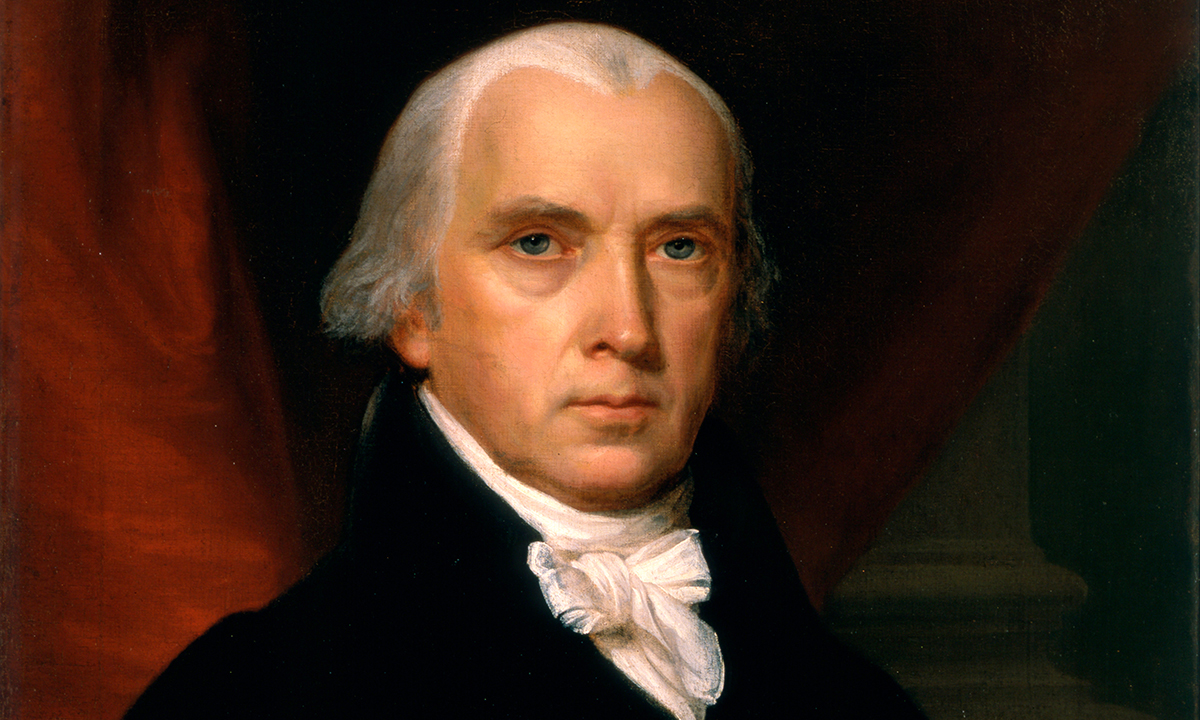

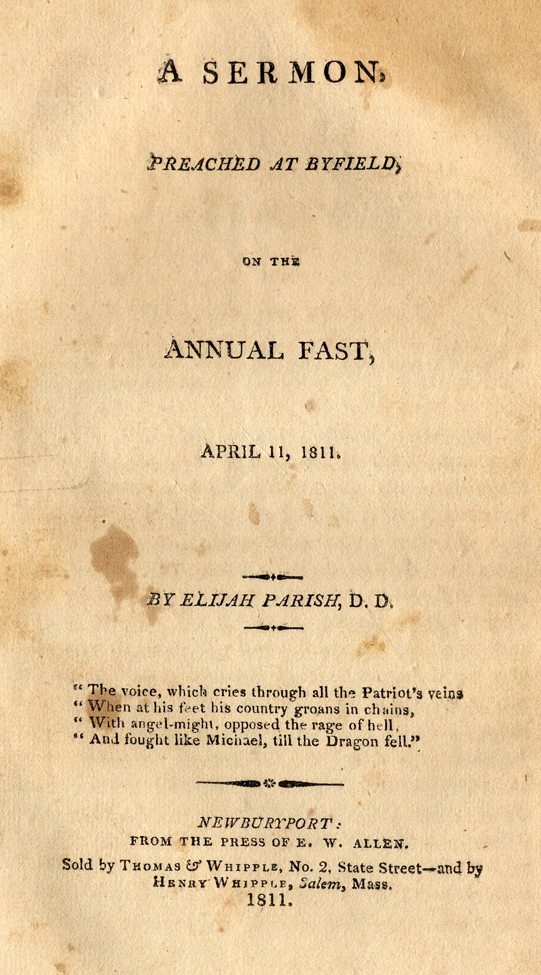
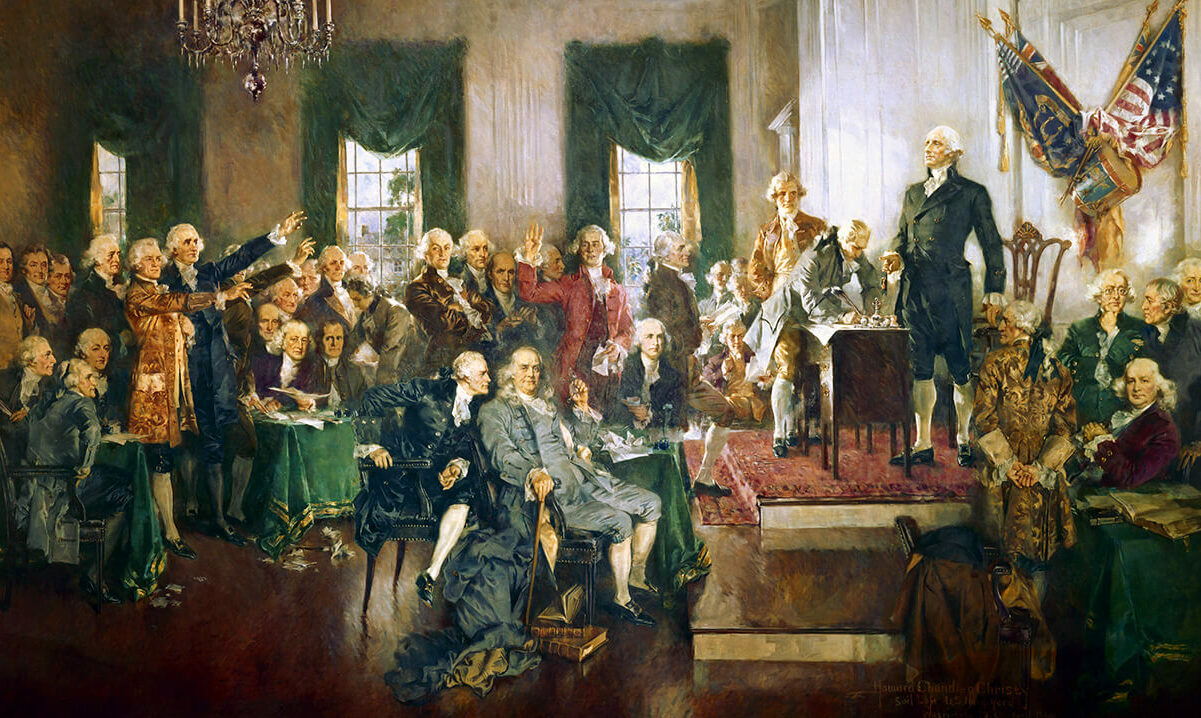
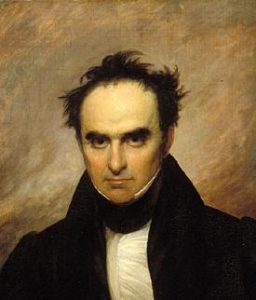 Daniel Webster, an ardent and outspoken Christian known as “the Defender of the US Constitution,”
Daniel Webster, an ardent and outspoken Christian known as “the Defender of the US Constitution,” 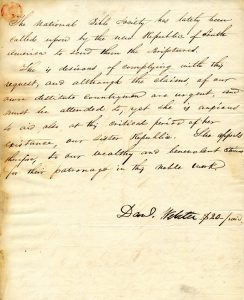 Additionally, WallBuilders posted from our massive collection of original documents a letter that Daniel wrote in an attempt to help provide Bibles to the people of South America.
Additionally, WallBuilders posted from our massive collection of original documents a letter that Daniel wrote in an attempt to help provide Bibles to the people of South America.
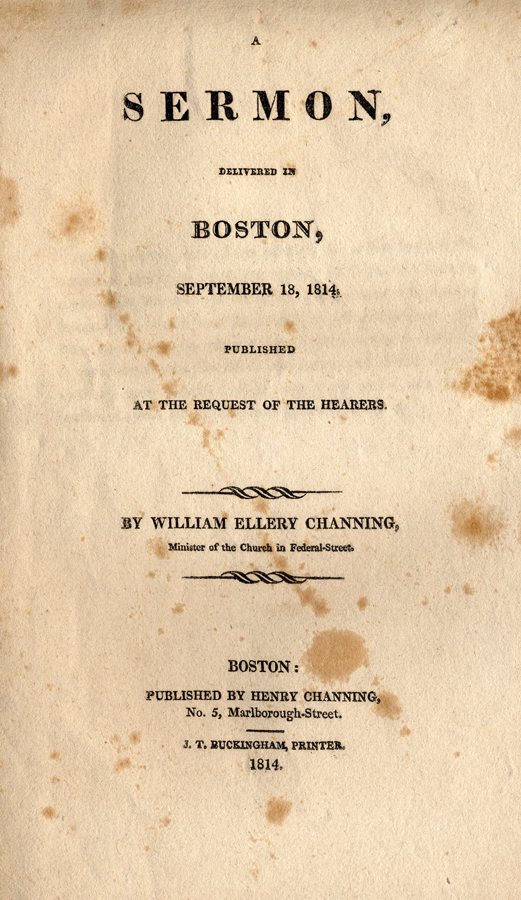
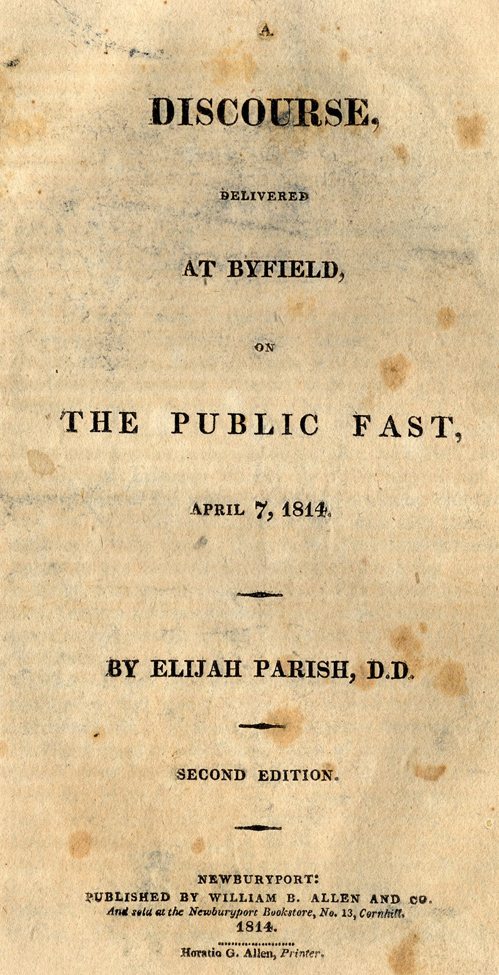
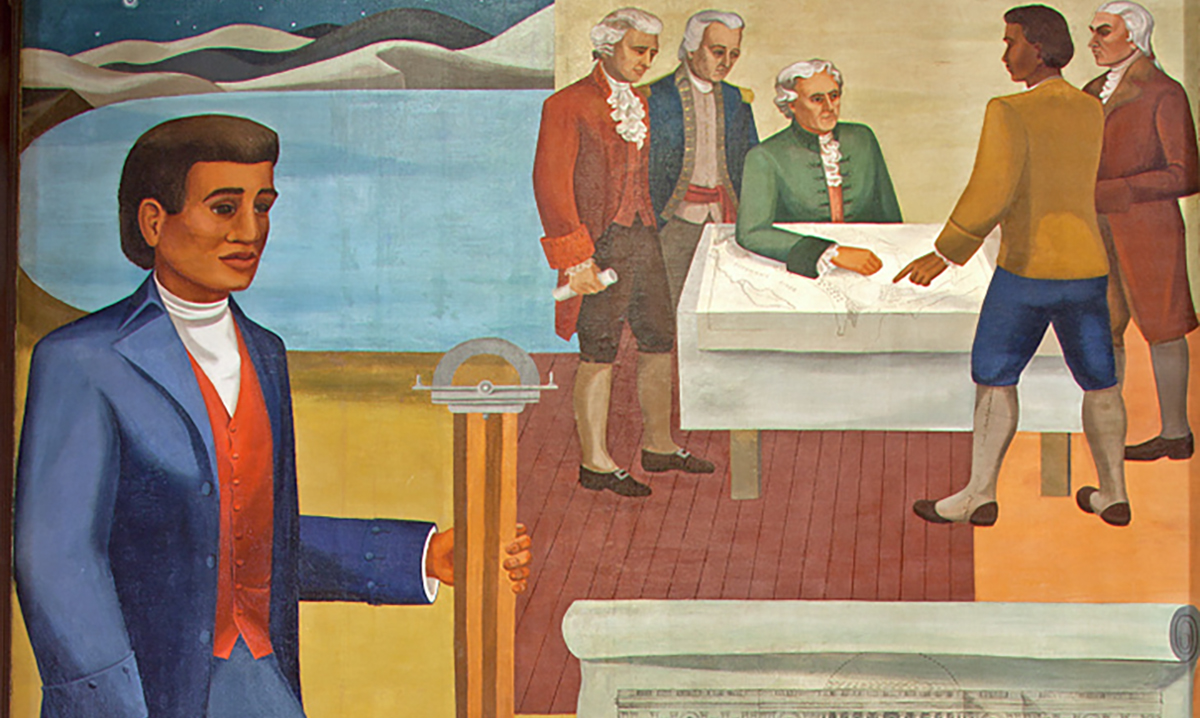

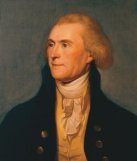
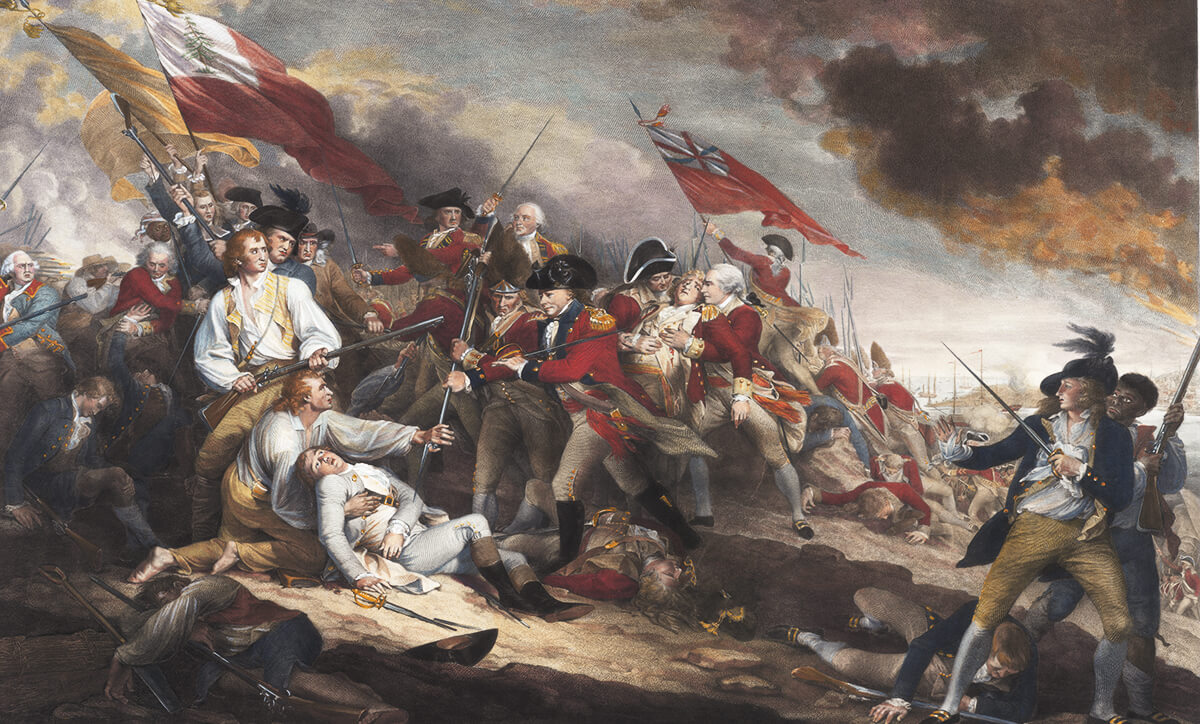

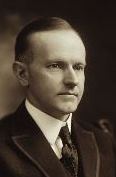 No one can examine this record and escape the conclusion that in the great outline of its principles the Declaration was the result of the religious teachings of the preceding period. . . . They are found in the texts, the sermons, and the writings of the early colonial clergy who were earnestly undertaking to instruct their congregations in the great mystery of how to live. . . . Placing every man on a plane where he acknowledged no superiors, where no one possessed any right to rule over him, he must inevitably choose his own rulers through a system of self-government.
No one can examine this record and escape the conclusion that in the great outline of its principles the Declaration was the result of the religious teachings of the preceding period. . . . They are found in the texts, the sermons, and the writings of the early colonial clergy who were earnestly undertaking to instruct their congregations in the great mystery of how to live. . . . Placing every man on a plane where he acknowledged no superiors, where no one possessed any right to rule over him, he must inevitably choose his own rulers through a system of self-government.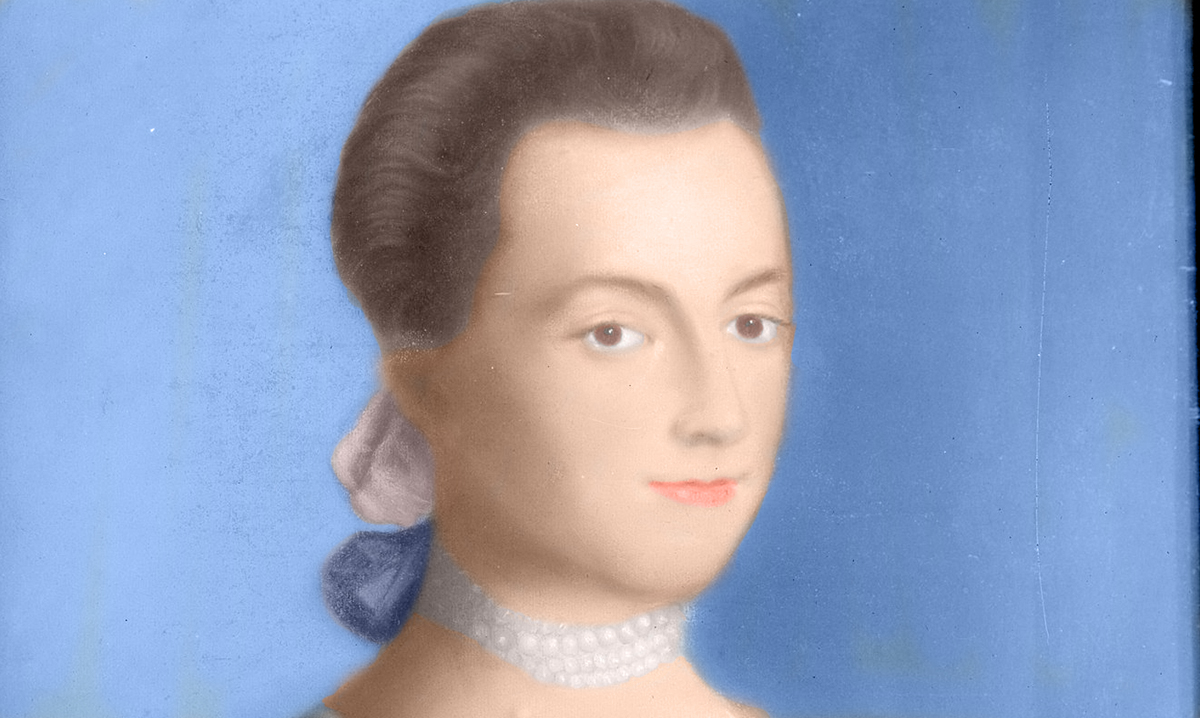
 Though her poor health kept her from receiving a formal education, Abigail rose above this, teaching herself to master several areas of study, including even learning a foreign language. She was the close confidant of her husband John Adams, who trusted her counsel and relied on her for sound military intelligence information as well as political guidance. She was an excellent business woman, a faithful wife, and a devoted mother. The first woman to live in the White House, she was the wife of one U. S. President and the mother of another. She was also a strong and outspoken Christian, leaving behind a rich legacy in her extensive personal writings.
Though her poor health kept her from receiving a formal education, Abigail rose above this, teaching herself to master several areas of study, including even learning a foreign language. She was the close confidant of her husband John Adams, who trusted her counsel and relied on her for sound military intelligence information as well as political guidance. She was an excellent business woman, a faithful wife, and a devoted mother. The first woman to live in the White House, she was the wife of one U. S. President and the mother of another. She was also a strong and outspoken Christian, leaving behind a rich legacy in her extensive personal writings.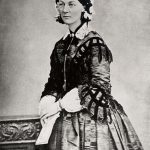 Born into a wealthy English family, Florence Nightingale went against society’s expectations to fulfill God’s divine call of service on her life
Born into a wealthy English family, Florence Nightingale went against society’s expectations to fulfill God’s divine call of service on her life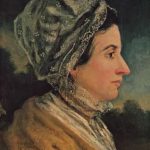 “The hand that rocks the cradle is the hand that rules the world.” From her post as the mother of a busy household in the Epworth rectory, Susanna Wesley trained up a generation that would change the world. She provided the well-regulated primary education for her 10 children that lived past infancy.
“The hand that rocks the cradle is the hand that rules the world.” From her post as the mother of a busy household in the Epworth rectory, Susanna Wesley trained up a generation that would change the world. She provided the well-regulated primary education for her 10 children that lived past infancy.